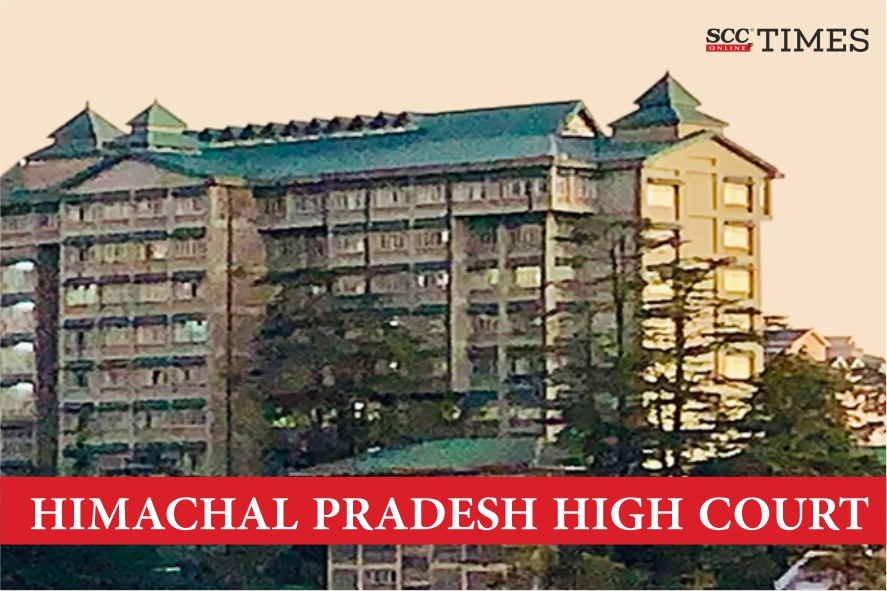Himachal Pradesh High Court: In a petition filed questioning the order dated 12-10-2020, passed by the Ombudsman of Respondent 1-Board and seeking a direction to Respondent 1 to refund 50% of the amount paid by the petitioner, the Division Bench of M.S. Ramachandra Rao, CJ* and Satyen Vaidya, J., stated that Respondents 1 to 3 had not been able to show any statutory rule or regulation framed as on 25-4-2019, i.e., date of application made by the petitioner for a new connection to Respondent 1,which empowered them to make the petitioner, pay the late payment surcharge of the previous owner. The Court stated that since, there was no such provision, Respondents 1-3 could not ask the petitioner, to pay the late payment surcharge dues of the previous owner.
Thus, the Court stated that impugned order passed by the Ombudsman of Respondent 1 and the order dated 19-02-2020 of the Consumer Grievance Redressal Forum of Respondent 1, could not be sustained and set aside the orders passed by the Ombudsman of Respondent 1 and Consumers Grievances Redressal Forum.
Background
In the present case, SMSN Continental Private Limited, the petitioner, was a Company registered under the Companies Act, 1956. Himachal Pradesh State Electricity Board-Respondent 1 provided electricity to consumers as per the applicable statute and rules, and Respondent 4 was the Himachal Pradesh Electricity Regulatory Commission, Shimla (‘HPERC’).
Vardhman Roofing Private Limited (‘Vardhaman Company’) was owning factory land, building, plant and machinery, at Mouza Kheri, Sirmour, Himachal Pradesh. Vardhaman company borrowed lands from Bank of India and could not repay back the loans. Thus, the bank initiated the proceedings under the Securitization and Reconstruction of Financial Assets and Enforcement of Security Interest Act, 2002 for sale of the above assets of the Vardhaman Company and conducted an e-public auction on 15-10-2018.
The petitioner participated in the said public e-auction and became the highest bidder of the assets of Vardhman Company. The sale was confirmed in the petitioner’s favour and possession receipt was handed over to the petitioner. The petitioner discovered that a sum of Rs. 39,05,735 was owed by the Vardhaman Company to Respondent 1. Thereafter, under duress, the petitioner deposited the said outstanding amount with Respondent 1 for getting the charges cleared under the revenue record. Subsequently, Respondent 1 granted a ‘No Due Certificate’ to the petitioner. Thereafter the District Collector transferred the lands and building in the name of the petitioner in the Revenue records.
Later, the petitioner submitted an application to Respondent 1 and applied for a new electricity connection. However, as per the petitioner, when it approached Respondent 1 for release of new electricity connection, its employees refused to do so, stating verbally that the petitioner should also pay “late payment surcharge” amounts owed by the previous owner.
Thus, the petitioner filed the complaint before the Consumers Grievances Redressal Forum at Kasumpti, Shimla, whereby the petitioner’s complaint was dismissed vide order dated 19-02-2020. Thereafter, the petitioner approached the Ombudsman of Respondent 1 under Regulations 28(1) and 28(2) and 33 of the HPERC (Consumer Grievances Redressal Forum and Ombudsman) Regulations, 2013, challenging the order passed by the Consumers Grievances Redressal Forum. However, the complaint was rejected, and the petitioner filed the present petition.
Analysis, Law, and Decision
The Court stated that where the statutory rules authorized the supplier of electricity to demand arrears due by the previous owner/occupier, from the purchaser of a property claiming reconnection or fresh connection of electricity, then the supplier could recover the arrears from a purchaser also. Otherwise, the supplier could not demand the same from the purchaser the electricity dues of the previous owner. The Court stated that since, there was no such provision, Respondents 1-3 could not ask the petitioner, to pay the late payment surcharge dues of the previous owner.
The Court stated that in the impugned order, the Ombudsman made the mistake of treating the petitioner as the old owner, with an altered name and applied the Sales Manual Instruction, which would not apply to a new owner of the premises. The Sales Manual Instruction would apply only to the owner of the premises who was already a consumer, whose electricity supply was disconnected previously and was seeking reconnection of the same.
The Court stated that the amended Regulation 10(iv) of HPERC (Recovery of Expenditure for Supply of Electricity) (Fifth Amendment) Regulations, 2018 indicated that the said clause provided for a reduction by 100% of the amount calculation of the amount of infrastructural development charges and other costs payable by an applicant for connected load, if the applicant cleared all outstanding dues against the original connection and against all such previous connections.
The Court stated this amendment nowhere authorized the collection of late payment surcharge, as was sought to be contended by Respondents 1-3 in the present case. Therefore, the Court held that Respondents 1 to 3 had not been able to show any statutory rule or regulation framed as on 25-4-2019, which empowered them to make the petitioner, pay the late payment surcharge of the previous owner.
Thus, the Court stated that impugned order passed by the Ombudsman of Respondent 1 and the order dated 19-02-2020 of the Consumer Grievance Redressal Forum of Respondent 1, could not be sustained, and set aside the orders passed by the Ombudsman of Respondent 1 and Consumers Grievances Redressal Forum. Accordingly, the Court directed Respondents 1-3 to refund the petitioner, a sum of Rs. 79,88,902, within four weeks with interest at the rate of 6% per annum be paid by Respondents 1-3 on the said amount to the petitioner, from date of deposit till the date of refund of the same.
[SMSN Continental (P) Ltd. v. H.P. SEB, 2024 SCC OnLine HP 4250, decided on 30-08-2024]
*Judgment authored by- Chief Justice M.S Ramachandra Rao
Advocates who appeared in this case:
For the Petitioner: Sunil Mohan Goel, Vipul Sharda, Vibhu Anshuman and Akhshit Chaudhary, Advocates;
For the Respondents: Sunita Sharma, Senior Advocate with Anirudh and Tawarsu, Advocates.






